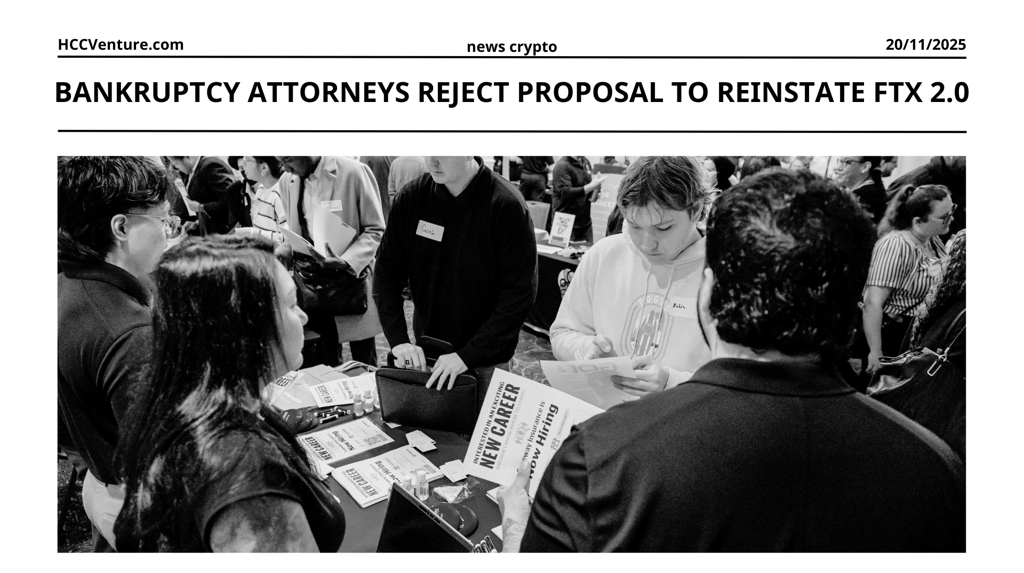Bankruptcy Attorneys Reject Proposal to Reinstate FTX
FTX's bankruptcy filing, filed on November 11, 2022, amid the discovery of an $8 billion loss from mixed customer funds, initially raised hopes for an FTX 2.0 reboot.
11/20/20252 min read


Blocked bidders - billions lost
The long-awaited revival of FTX — often referred to as “FTX 2.0” — has suffered a major blow. According to sources close to the bankruptcy, all bidders proposing to restart the exchange were rejected by court-appointed bankruptcy attorneys, effectively extinguishing any near-term prospects of FTX returning to operations.
The decision has sparked controversy among creditors, investors, and industry observers, many of whom argue that a viable reboot could create better long-term value than a straight liquidation. For now, the collapse of FTX 2.0 talks underscores the deep structural and legal complexities surrounding the property.
Why FTX 2.0 Contractors Are Rejected
Although several parties — including venture capital firms, exchange operators, and restructuring experts — have filed formal proposals to acquire or relaunch the FTX platform, bankruptcy attorneys overseeing the exchange reportedly did not find any proposals “sufficiently protective” of creditors’ rights.
Key concerns are said to include:
The proposals are undervalued, devaluing FTX's technology, brand, and user base
Insufficient capital to ensure compliance with new regulations and capital requirements
Legal risks, particularly related to past fraud and potential claims
Lack of clarity on operations, including how a rebooted exchange will separate old liabilities
Market concerns about reputational damage and user confidence
Some bidders also wanted to be partially exempted from legacy liability — something the exchange's legal team was unwilling to negotiate.
Our insight view
The rejection of all offers to buy FTX 2.0 marks a pivotal moment. It signals that FTX will almost certainly not return in any form resembling its previous operations. The company is moving towards liquidation of all assets.
Financially, the decision reflects prudent risk management; but strategically, it may be a missed opportunity to transform a failed exchange into a future-facing digital market infrastructure platform—one that could create billions of dollars in long-term value.
Crypto bankruptcies are not structured to maximize innovation or recovery — they are structured to minimize legal risk.
For an industry built on decentralization, experimentation, and risk-responsive growth, this is a clear and sobering contradiction.
Disclaimer: The information presented in this article is the author's personal opinion in the cryptocurrency field. It is not intended to be financial or investment advice. Any investment decision should be based on careful consideration of your personal portfolio and risk tolerance. The views expressed in this article do not represent the official position of the platform. We recommend that readers conduct their own research and consult with a professional before making any investment decisions.
Explore HCCVenture group
HCCVenture © 2023. All rights reserved.

Connect with us
Popular content
Contact to us
E-mail : sp_contact@hccventure.com
Register : https://linktr.ee/holdcoincventure
Disclaimer: The information on this website is for informational purposes only and should not be considered investment advice. We are not responsible for any risks or losses arising from investment decisions based on the content here.


TERMS AND CONDITIONS • CUSTOMER PROTECTION POLICY
ANALYTICAL AND NEWS CONTENT IS COMPILED AND PROVIDED BY EXPERTS IN THE FIELD OF DIGITAL FINANCE AND BLOCKCHAIN BELONGING TO HCCVENTURE ORGANIZATION, INCLUDING OWNERSHIP OF THE CONTENT.
RESPONSIBLE FOR MANAGING ALL CONTENT AND ANALYSIS: HCCVENTURE FOUNDER - TRUONG MINH HUY
Read warnings about scams and phishing emails — REPORT A PROBLEM WITH OUR SITE.
